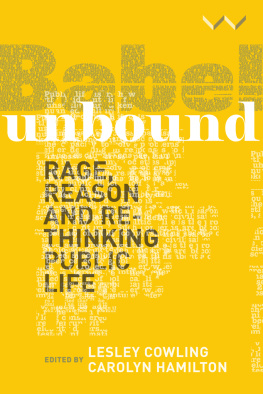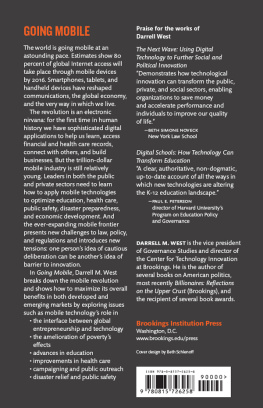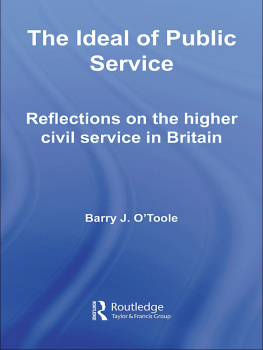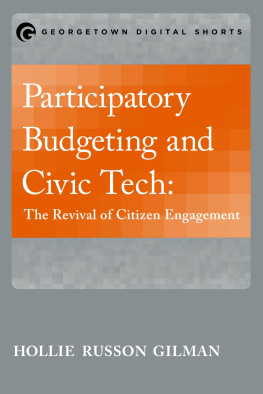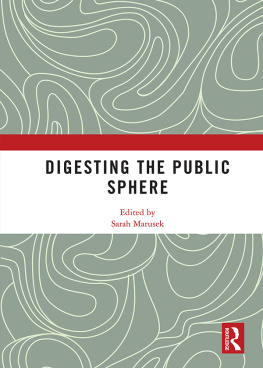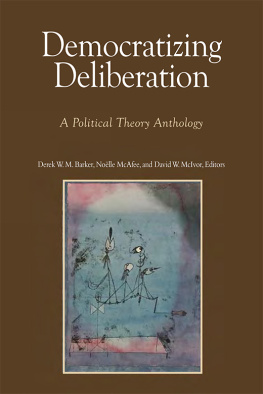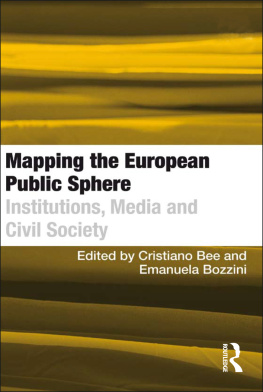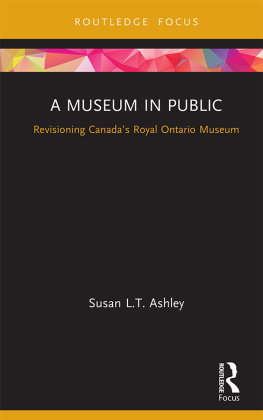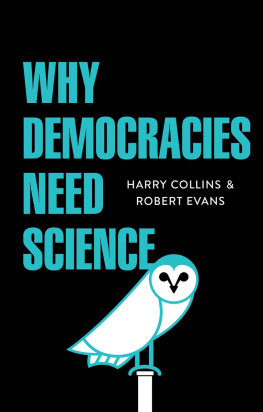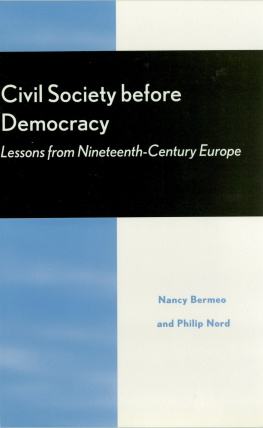BABEL UNBOUND
BABEL UNBOUND
RAGE, REASON AND RETHINKING PUBLIC LIFE
EDITED BY
LESLEY COWLING AND CAROLYN HAMILTON
Published in South Africa by:
Wits University Press
1 Jan Smuts Avenue
Johannesburg 2001
www.witspress.co.za
Compilation Editors 2020
Chapters Individual contributors 2020
Published edition Wits University Press 2020
First published 2020
http://dx.doi.org.10.18772/22020055898
978-1-77614-589-8 (Paperback)
978-1-77614-593-5 (Hardback)
978-1-77614-590-4 (Web PDF)
978-1-77614-591-1 (EPUB)
978-1-77614-592-8 (Mobi)
All rights reserved. No part of this publication may be reproduced, stored in a retrieval system, or transmitted in any form or by any means, electronic, mechanical, photocopying, recording or otherwise, without the written permission of the publisher, except in accordance with the provisions of the Copyright Act, Act 98 of 1978.
Project manager: Simon Chislett
Copyeditor: Alison Lockhart
Proofreader: Lisa Compton
Indexer: Tessa Botha
Cover design: Hothouse
Typeset in 10 point Minion Pro
CONTENTS
Lesley Cowling and Carolyn Hamilton
Carolyn Hamilton and Lesley Cowling
Carolyn Hamilton, Litheko Modisane and Rory Bester
Lesley Cowling and Pascal Newbourne Mwale
Indra de Lanerolle
Litheko Modisane
Carolyn Hamilton
Susana Molins Lliteras
Camalita Naicker
Nomusa Makhubu
Anthea Garman
ACKNOWLEDGEMENTS
B abel Unbound has its roots in the Constitution of Public Intellectual Life Research Project, which ran from 2004 to 2008 at the University of the Witwatersrand, and the Media and Public Debate project, a student research focus in the Wits Journalism programme. The book drew on the ideas and research developed in the collaborative work of the core group of Public Intellectual Life, which consisted of Rory Bester, Lesley Cowling, Anthea Garman, Carolyn Hamilton, Litheko Modisane, Pascal Mwale, Alan Finlay and, in its first phase, Yvette Gresl and Windsor Leroke. The four-year project was supported by Atlantic Philanthropies and the generous engagement of many Wits colleagues most especially, Isabel Hofmeyr, Shireen Hassim and Leon de Kock. The Wits Journalism student researchers of the Media and Public Debate project, supervised by Lesley Cowling and Carolyn Hamilton, also shaped our thinking by contributing to scholarship on the topic. They included Nikiwe Bikitsha, Nazeem Dramat, Rebecca Kahn, Refiloe Lepere, Itumeleng Mahabane, Philile Masango, Taryn McKay, Vuyo Mthembu, Sibusiso Nkomo, Favour Nunoo, Shirona Patel, Nomzamo Petje, Magali Reinert, Henk Rossouw, Rehana Rossouw and Kenichi Serino.
We benefited also from productive discussions in the Archive and Public Culture Research Development Workshop at the University of Cape Town and from the comments of our anonymous reviewers.
The book project received financial support from the Andrew W. Mellon Foundation, the National Research Foundation and the research offices of the universities of Cape Town and the Witwatersrand.
Introduction
Lesley Cowling and Carolyn Hamilton
I t has been an article of faith in modern societies that in order to live together, we need to talk to one another. The premise is that, through dialogue, communities can mediate different needs, solve pressing problems, decide on leaders and come to some consensus on issues that confront collective life. Public life is rich with activity: arguments expertly laid out in formal arenas, spectacles that unsettle our taken-for-granted convictions, and nuanced cultural engagements designed to provoke reflection. But this imagined foundation for how we live collectively seems to have suffered a dramatic collapse. All over the world, dialogue seems impossible across partisan politics and religious divides. Many societies appear to have lost the capacity to solve problems through talk whether deciding on responses to international crises, such as climate change, human rights abuses and nuclear proliferation, or resolving local issues closer to home. This situation has evoked global confusion and alarm, with analysts unable to fully explain the multiple disruptions to public life. The future of public discussion as a mediating force in society cannot be taken for granted. And the stakes are high. Arguably, the greatest challenge of our times is how we address the global climate emergency in this context, a problem that requires collective engagement and decision-making on a global level.
Political philosopher Achille Mbembe delineates the end of a world in which the articles of faith of modern democracies have held sway. For Mbembe, politics is increasingly a street fight in which reason and facts matter less and less: Whether civilisation can give rise to any form of political life is the problem of the 21st century. Such concerns are becoming the substance of public conversations about a crisis that prevails across much of the world. Information, evidence and facts needed to inform decisions and choices cannot be relied upon.
Indeed, the recognised spaces of political life seem largely to have been ceded to global capitalism: states, their sovereignty eroded, are everywhere captured by economic interests. Capture refers to the reach of power into democratic institutions in order to make them vehicles to advantage political cronies and elites, rather than the broad people.
The idea of society existing for the mutual benefit of individuals and based on a presumption of equality has long dominated global social imaginaries of how we live together. Exactly what is meant by equality will vary, but that it must be affirmed in some form follows from the rejection of [the pre-democratic] hierarchical order. There is, however, a contradiction at the heart of modernity in that the free market, with its focus on the maximisation of profit, works against the realisation of an egalitarian society.
The extent of the failures in how we mediate collective life shows how crucial it is to understand the workings of the taken-for-granted and ever-present processes of public engagement, in all their multiple and sometimes unrecognised forms. Public engagements can, for instance, include expert discussions on health, gender and equity policies the classic public debate with its links to citizenship and democracy and the requirement for informed argument but also social media battles over whether to vaccinate your child, protests against rape by women baring their bodies or photographic exhibitions and performance art.
In many societies, the very terms of debate about collective life are being contested. This has been starkly visible in global protests in the last decade, from the Occupy movement in the United States to the gilets jaunes (yellow vests) in France. Student protesters made a point of challenging not only what the universities were doing in terms of curriculum and hiring policies, but also the terms on which debate and discussion could take place in and about the university. Where the universities sought to insist that debate should take place in designated forums, with points raised, listened to and argued with, protesters asserted that these forums were governed by white cultural norms, conventions and assumptions that prejudiced them and dismissed their concerns. Similarly, student movements in the United States have actively contested what discussions can take place in classrooms, through requests for trigger warnings on potentially upsetting content and tactics such as the circulation of recorded footage of lecturers on social media. Race and gender concerns and issues of identity are key to these contestations. In many cases, the very archives that are used to establish the histories that underpin contemporary analyses are challenged.

